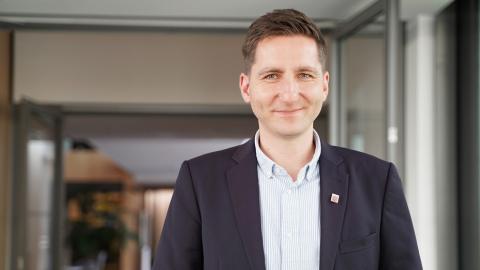Money laundering is causing harm to democratic communities, their citizens and the financial system. Accordingly, it is a particular concern for the State of Hesse with its financial centre in Frankfurt to resolutely pursue and take specific action to strengthen the fight against money-laundering and terrorist financing in a joint effort with the Federal Government and the EU. For this reason, the Federal Ministry of Finance, the Permanent Representation of the Federal Republic of Germany to the EU, the Hessian State Chancellery and the Hessian Ministry of Finance had invited top-class experts from the European Parliament, the Council and the Commission, the Federal Government and the finance industry to a panel discussion. It took place at the Hessian State Representation in Brussels in order to jointly discuss the current status of European negotiations on anti-money-laundering on the occasion of the event dedicated to "Pushing anti-money-laundering to a higher level". Among other points, the focus of this event was on the new European set of rules and on the EU's new Anti-Money-Laundering Authority which is to be created (abbreviated as AMLA).
Dr Florian Toncar, Parliamentary State Secretary at the Federal Ministry of Finance, formulated a clear claim with high standards: "We Europeans must be best in class as compared to international standards when it comes to the fight against money-laundering and terrorist financing, and also to protect the internal market. The improved uniform set of rules applicable in the area of money-laundering, and the establishment of the EU's new AMLA Anti-Money-Laundering Authority will make the institutional and legal framework ‘fit for purpose’ to fight against money laundering."
Lucia Puttrich, Hesse's Minister for Federal and European Affairs, declared: "Faced with the fact that criminal activities have a cross-border character, the EU's new Anti-Money-Laundering Authority will make an important contribution to the fight against money-laundering and terrorist financing. Among other objectives, it will contribute to harmonising and coordinating supervisory methods in the finance and non-finance sectors, to directly supervising high-risk and cross-border finance companies, and to coordinating the central registration offices. Frankfurt is one of the top financial centres in the EU, and home to the ECB which would make it an ideal seat for this authority as well. For this reason, we have been advocating in favour of choosing Frankfurt as its seat on a European level for a very long time, and we can see that, concerning this application, people at all levels in Germany are pulling in the same direction."
Dr Martin Worms, State Secretary at the Hessian Ministry of Finance, welcomed the steps taken by the EU Commission and by the Federal Government with a view to persecuting money-laundering and terrorist financing. "In this context, AMLA will make an important contribution to a forceful and coherent fight against money-laundering in the EU. I am very hopeful that, at the end of this decision-making process, we will be able to jointly state: Here is an AMLA with grit." When it comes to fighting against money-laundering and terrorist financing, Hesse is pulling in the same direction as the Federal Government and the EU. To support this statement, Mr Worms made reference to the example given by the Darmstadt Working Group, which is coordinated by the Darmstadt Regional Council and active in anti-money-laundering in the non-finance sector, and to the Anti Financial Crime Alliance (AFCA) set up as a public-private-partnership in which federal and state authorities as well as companies from the finance and non-finance sectors joined forces in order to cooperate in their anti-money-laundering activities.
The Federal Government, the State of Hesse and the City of Frankfurt are firmly convinced that the Frankfurt financial centre provides unique locational advantages to AMLA as highlighted by State Secretary Dr Worms. "Due to the large number of public authorities present, Frankfurt offers concentrated supervisory competence, close proximity to an utmost variety of financial institutions ranging from regional banks to global players in addition to a markedly sustainable and innovative location providing a wide choice of certified and immediately available office real estate." What is more, the city also offers a high quality of life while living expenses are at a moderate level by EU standards. Junior staff educated at colleges and universities also create an extraordinary environment for recruiting new employees in Frankfurt. Dr Worms expressed his conviction that: “Taking a decision in favour of Frankfurt would guarantee that AMLA will become operational swiftly, thus enabling us to jointly promote anti-money-laundering in the EU.”
Parliamentary State Secretary at the Federal Ministry of Finance, Dr Toncar, stated: "We are on the right track with the new supervisory architecture we are creating in the EU right now. It is key that AMLA's future location is also ideally equipped for converting the EU into a vanguard in the fight against money-laundering. And Frankfurt combines everything which is indispensable for AMLA: Having the ECB and SSM as its supervisory arm present on site ensures that AMLA will be able to exchange the information required for effective supervision quickly and easily. AMLA can also draw on the rich pool of talents available at this location, and offer an attractive and international city with a maximum quality-of-life as a place to live in to its employees from all over the EU."
Efforts to become better at anti-money-laundering are also underway at a national level. In this regard, Dr Toncar also outlined the key points for the national reform project which aims at strengthening the fight against financial crime, and is currently being prepared by the Federal Ministry of Finance. Specifically, the objective is to bring together core competencies under a single roof, to train highly qualified financial investigators, and to press ahead with the digitalization and networking of registers.

